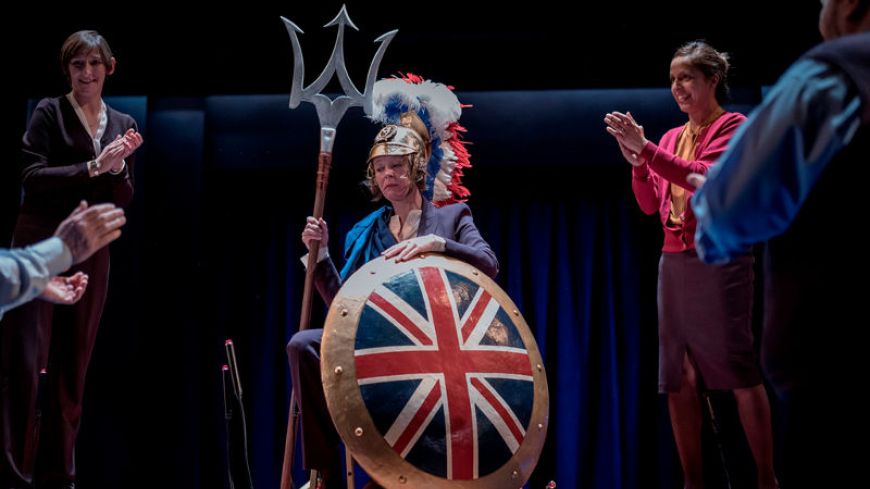
There’s always that moment for the seasoned theatre-goer when you know it’s verbatim theatre and there’s a row of chairs along the back of the playing area. Here we go is the thought that comes to mind, Alan Bennett’s ‘Talking Heads’ taken literally…
At times, Carol Ann Duffy’s ‘My Country’ almost justifies such prejudiced hesitation, yet all of her amalgamated vox populi also have their particular moments approaching clarity and lucidity. This alone is something of an achievement, given the subject matter of attitudes and reactions to UK withdrawal from the European Union and indeed to the continuation of the United Kingdom itself.
The script necessarily meanders somewhat through and between the arguments against and in favour of both. Duffy’s text, based on interviews conducted in various parts of these islands, ends up discussing the latter topic (the fate of the UK) rather more than it does the former.
Britannia (Penny Layden) enters, and begins to re-arrange the furniture, only the first part of her thankless tasks. Acting like some latter-day Aunt Ada Doom, who features in Stella Gibbons’ satiric rural dystopia, ‘Cold Comfort Farm’, Britannia has summoned the representatives of various parts of her island home to discuss its present state.
What a state one might reasonably respond, and those in particular tasked with embodying the ‘Celtic fringes’ do so at some length. For all that, the real issues at stake seem to slip through their and Duffy’s fingers.
As the late Benedict Anderson has pointed out in ‘Imagined Communities’, national consciousness arises irremediably out of language; we are what we talk, and like the Prince of Denmark, forgive us if we talk a little wild at times, for we have it from our fathers (and mothers). Politicians in these islands have, in recent years, become keen on ‘national conversations’ at the very point when, like Captain Macmorris in Shakespeare’s Henry V, more and more of us ask ‘what ish my nation?’ and decide it probably isn’t the one we thought we were living in.
Duffy’s regional and national archetypes suggest a family, yet the language her interviewees employ is not altogether familial; what seems to have been lost in the fury stoked by the debate over the European Union is our abilities to talk to each other with civility, and this emerges very clearly over the course of ‘My Country’. Britannia’s plea that we ‘search for good leadership’ implies searching for a quality that resides in a single person or solution, confined to ‘this scepter‘d isle’. Some of us might wish to argue otherwise.
Runs til 13 May

